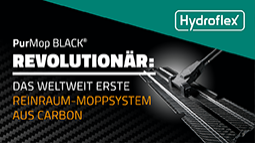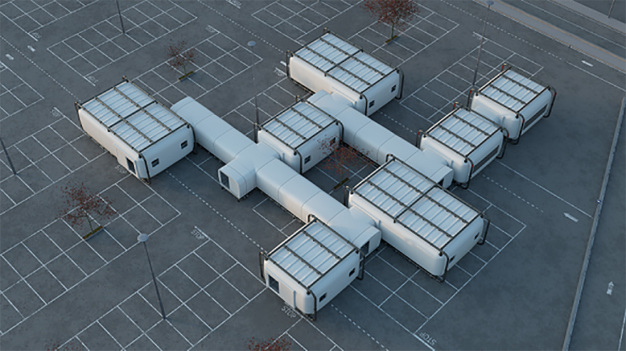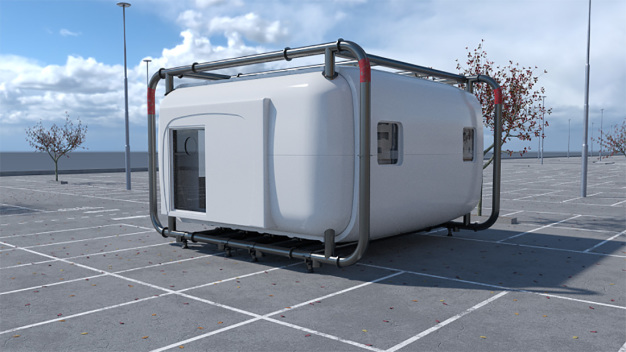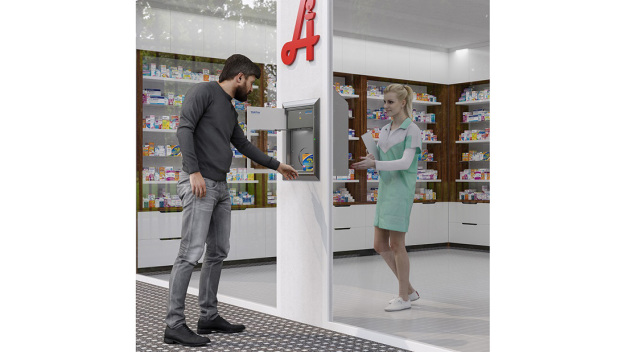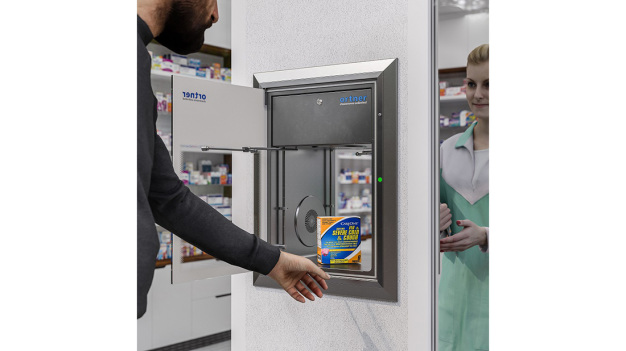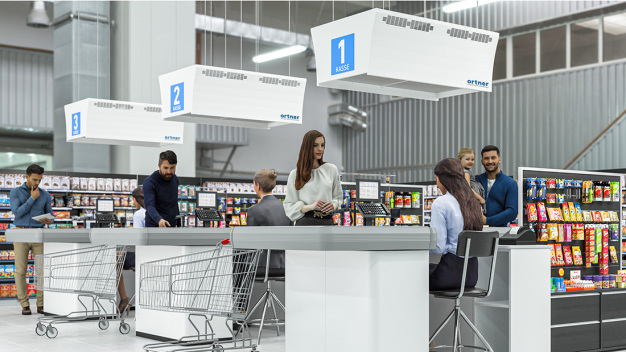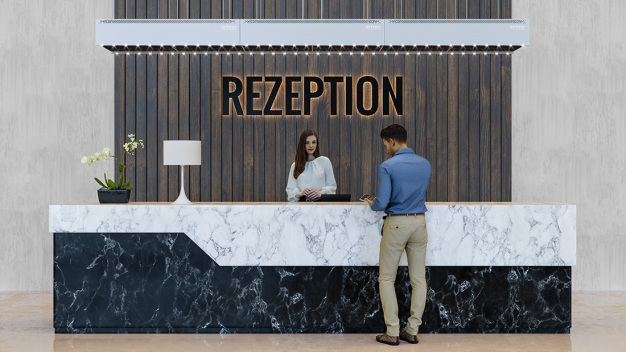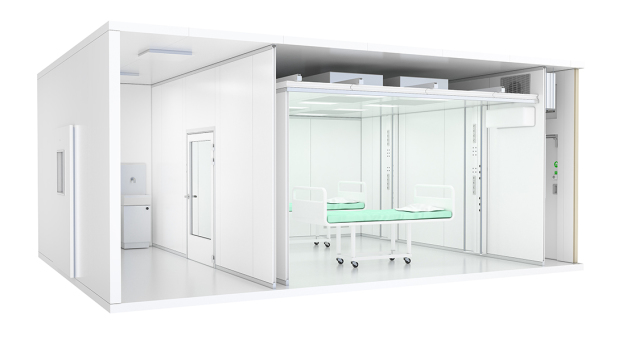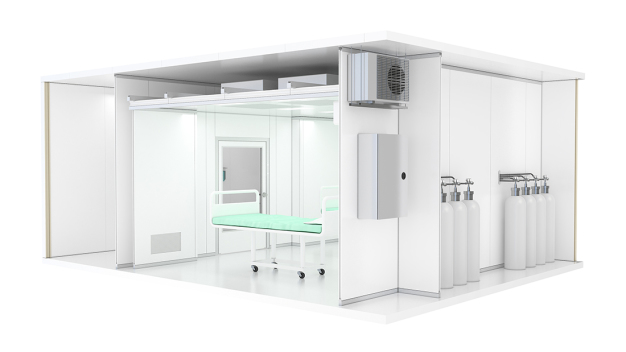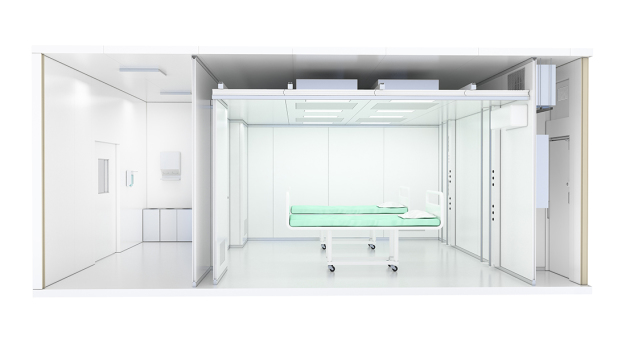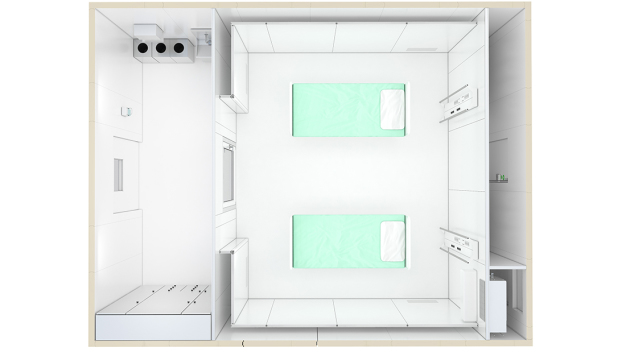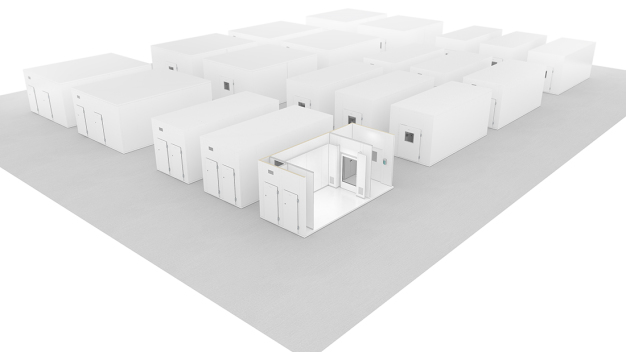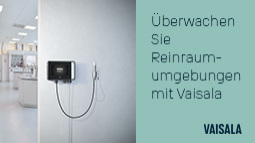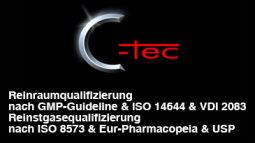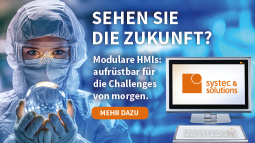- F+E & Interessengemeinschaft
Hygienetechnik contra Corona-Virus
Bestimmte Berufe als „systemrelevant“ einzustufen, ist einfach. Sie tatsächlich effektiv gegen drohende Infektionen zu schützen, ist wesentlich herausfordernder. Noch zu selten greifen Handel und Behörden auf technische Schutzeinrichtungen zurück, die längst zur Verfügung stehen. Das Deutsche ReinraumInstitut (DRRI) vermittelt einsatzbereite technische Schutzmaßnahmen gegen das Corona-Virus an Krankenhäuser, Supermärkte und Einsatzkräfte.
Solange kein Impfstoff gefunden ist, scheint es im Kampf gegen die Corona-Infektionswelle nur eine Strategie zu geben: Wir halten uns voneinander fern. Soziale Isolation, Kontaktverbote und Ausgangssperren können die Weitergabe des Virus jedoch lediglich verlangsamen. Sie bieten keinen kompletten Schutz, vor allem nicht für diejenigen, die an Supermarktkassen oder im Transportgewerbe weiterarbeiten, und auch nicht für jene, die im Gesundheitswesen und der Polizei unverzichtbare Dienste an der Bevölkerung leisten. Sie alle sind nicht oder nicht ausreichend auf die Begegnung mit dem Virus vorbereitet. Verhaltensänderungen genügen nicht. Technische Lösungen sind gefragt.
Die gute Nachricht lautet: Diese Lösungen gibt es bereits – vom mobilen Krankenhaus für 500 Corona-Patienten über Luftfilter, deren Luftstrom eine Schutzhülle um Kassiererinnen und Apotheker bildet, bis hin zur Ausweitung von Corona-Tests auf weite Teile der Bevölkerung mit Laborkapazitäten, die in Großlaboren vorbereitet werden. Lösungen wie diese und mehr stehen abrufbereit bei Unternehmen der Reinraumtechnikbranche zur Verfügung. Sie sind technisch ausgereift und kommen teilweise seit Jahrzehnten in verschiedenen Branchen wie der Medizin, Mikroelektronik und Lebensmittelherstellung zum Einsatz. Das Wissen der Reinraumtechniker zum Umgang mit gefährlichen Keimen ist aufgrund der Krise nicht mehr nur in speziellen sensiblen Branchen gefragt, sondern im gesamten Produktions- und Dienstleistungssektor sowie in Behörden. Warum also nicht auch zum Schutz von Mitarbeitern an der Supermarktkasse?
Improvisierter Schutz im Supermarkt ist keine Lösung
Bestimmte Berufsgruppen pauschal als „systemrelevant“ einzustufen ist das eine. Das gefährdete Personal etwa an der Ladenkasse tatsächlich effektiv zu schützen, wäre wesentlich herausfordernder.
Noch verbreitet sich das Virus viel schneller als praktikable Schutzmaßnahmen. Technische Lösungen als Antwort auf die Corona-Krise sind in der Öffentlichkeit weitgehend unbekannt. Wie die improvisierten Schutzmaßnahmen an Supermarktkassen zeigen, ist auch im Handel nur wenig Wissen über professionelle Sicherungsmaßnahmen vorhanden. Das wird sich, je länger die Krise andauert, vermutlich ändern. Dann werden auch dauerhafte Lösungen zum Einsatz kommen, die Mitarbeiter und Bevölkerung nicht nur vor Corona-Viren schützen, sondern auch vor anderen wiederkehrenden Infektionskrankheiten, etwa Grippe, oder allergieauslösenden Pollen.
Eine Lösung dafür, die sich rasch umsetzen ließe, bietet die Lufttechnik. Sie kann Mitarbeiterinnen und Mitarbeiter an Kassen und Warentheken wirksam vor Keimen schützen, die von Kunden hereingetragen werden. Das geht sogar recht einfach. Nötig wäre ein lediglich ein Stromanschluss für ein paketgroßes Filteraggregat, das über jedem stationären Verkaufsarbeitsplatz mit Kundenkontakt aufgehängt wird. Der leicht zu montierende Luftfilter zum Schutz des Kassenbereichs reinigt die angesaugte Luft und erzeugt einen ständigen Luftstrom als Schutzhülle für die Mitarbeiter. Diese Verdrängungsströmung – ein sogenannter Laminar Flow – hält Keime, die über die Luft transportiert werden, konstant vom Mitarbeiter fern. Die Strömung ist so eingestellt, dass sie nicht als unangenehm empfunden wird. Luftzugerscheinungen treten nicht auf. Auf die Art sorgen bereits Krankenhäuser oder die Lebensmittelindustrie für lokal saubere Arbeitsplatzverhältnisse. Der Filter in der steckerfertigen Box hält Herstellerangaben zufolge ca. fünf Jahre, der Stromverbrauch liegt ungefähr bei 150 bis 250 Watt/Stunde.
Anstelle professioneller Schutztechnik sieht man beim Einkauf jedoch vor allem improvisierte Behelfsmaßnahmen. Mitarbeiterinnen und Mitarbeiter sitzen nun hinter eilig angebrachten Plexiglasscheiben oder Folien, die den guten Willen ihres Arbeitgebers erkennen lassen, aber kaum schützen. Aus Sicht von Reinraumexperten haben sie eher eine symbolische Bedeutung oder leisten moralische Unterstützung. Ihr Maß und Design ist den Luftströmen vor Ort höchstens zufällig angemessen, gegen Kontaminierungen über Materialflüsse schützen sie gar nicht. Waren und Zahlungsmittel wandern meist von Hand zu Hand.
Ein ganzheitliches, durchdachtes Konzept sähe ganz anders aus. Es enthielte etwa automatisierte Warenschleusen an besonders gefährdeten Verkaufsorten wie an der Medikamentenausgabe in Apotheken. Diese Materialdurchreichen funktionieren berührungslos, sind belüftet und bieten ein höheres Schutzniveau als unbelüftete Ausgabesysteme. Sie lassen sich nach Angaben eines der Anbieter, Ortner Cleanrooms Unlimited aus Villach in Kärnten, anstelle der Tür einbauen und mit Gegensprechanlage versehen. Ein systematischer Ansatz würde auch den Einsatz geschulter Reinigungskräfte in Warenhäusern umfassen, wie er in Reinräumen üblich ist. Statt sporadisch mit der Sprühflasche mal die Griffe von Kühltruhen und Vitrinen abzuspritzen, sorgten sie systematisch für ein Mindestmaß an Dekontamination, trotz Publikumsverkehr.
Vom verlegbaren Krankenhaus zum mobilen Schleusencontainer
Der Handel ist nur eine der Branchen mit schutzbedürftigen Arbeitsplätzen. Viele Reinraumfirmen haben ihre Fachkräfte aus Anlass der Corona-Krise zur weiter gefassten Ideensammlung aufgefordert: Wie können Reinraum- und Laborspezialisten mit Lösungen helfen, die das Hygieneniveau überall in Wirtschaft und Gesellschaft deutlich erhöhen? Bei der Umsetzung der Vorschläge stoßen die Unternehmen aber an Grenzen, und das wortwörtlich. Viele ihrer Mitarbeiter können aufgrund der weltweit verhängten Quarantänemaßnahmen nur eingeschränkt arbeiten und reisen. Ausgangssperren und Hürden für Im- und Export hemmen die Geschäfte auch der Reinraumtechniker.
Ein Beispiel dafür ist die Fertigung eines mobilen Krankenhaus-Moduls im italienischen Ancona. Im Krisengebiet derzeit durch Anti-Corona-Maßnahmen selbst fast völlig lahmgelegt, sind die mobilen Module trotz des aktuellen Bedarfs eher eine Option für künftige Seuchenpräventionsprogramme. „Shellbe“ ist ein transportfähiger staub- und keimfreier Reinraum, der schneller errichtet werden kann als jedes stationäre Krankenhaus. Das erweiterbare Modul des deutsch-italienischen Adriatic Institute of Technology (AIT) könnte als mobile Krankenstation eingesetzt werden, aber auch als OP-Saal, Ambulanz, Apotheke oder Biolabor. „Shellbe“, der englische Namenspate des Moduls, setzt sich aus „Shelter“ für Schutzraum und „Shell“ für Hülle zusammen. Das Herzstück ist ein Basismodul von 6 mal 6 Metern Kantenlänge und 3 Metern Höhe, nicht größer als ein Buswartehäuschen. Es lässt sich komplett zerlegen und auf normalen Pick-ups transportieren, ob auf Straßen hierzulande oder auf unwegsamem Gelände in einem Entwicklungsland. Weitere Module ließen sich andocken und ebenso leicht wieder abtransportieren. Anlagen mit bis zu 1.000 Betten sind durchgeplant. Vorausschauende Beschaffung vorausgesetzt, können Betreiber damit auch im Krisenfall bedarfsgerecht bauen und die Kosten im Auge behalten.
Andere und ähnliche Projekte befinden sich in verschiedenen Stadien der Entwicklung. Das Ingenieurbüro DITTEL Engineering in Schlehdorf/Oberbayern und Viessmann Technologies in Hof haben vor Kurzem etwa die mobile Intensivpflegestation „DV Life Isle“ auf den Markt gebracht. In dieser lüftungstechnisch gegen die Außenwelt isolierten Umgebung könnten ein bis sechs Corona-Patienten betreut werden.
Einsatzbereit sind auch mobile Schleusencontainer. Für medizinisches Personal und Einsatzkräfte stellt der Übergang vom isolierten inneren Bereich zur ungeschützten Außenwelt ein besonderes Risiko dar. Die Gefahr in diesem Umkleidebereich lauert im Hautkontakt mit kontaminierter Schutzkleidung beim Ausziehen. Abhilfe schafft der Schleusencontainer. Personal in Schutzkleidung unterzieht sich darin einer Luft- oder Nassdusche und kleidet sich erst nach dieser Reinigung um. Dieses Schleusensystem eignet sich auch für Einsatzfelder wie die Personenkontrolle und -dekontamination in Flughäfen oder die Besucherströme in Krankenhäusern und Pflegeheimen.
Schleusen ließen sich in der äußeren Form herkömmlicher Container als sogenannte Safety Health Chamber in Eingangsbereichen aufstellen – überall, wo größere Menschenmengen durchgeschleust, kontrolliert, getestet oder untersucht werden müssen.
Mehr Testen: Den Worten können Taten folgen
Großlabore erweitern aktuell ihre Diagnostikkapazitäten. Beispielsweise arbeitet die Labor LS SE & Co. KG in Bad Bocklet nach eigenen Angaben „mit Hochdruck in Abstimmung mit den Behörden daran, einen Beitrag leisten zu können, Diagnostikkapazitäten für den aktuellen Infektionsfall aufzubauen“. Zudem trifft der Dienstleister Vorkehrungen, in seinen Laboren die Versorgungssicherheit – das heißt die Prüffähigkeit – aufrechtzuhalten. Alle in den Laboren Beschäftigten, auch das spezialisierte Reinigungsteam oder die Haustechniker, werden auf mikrobiologische Belastung kontrolliert.
Neben diesen Krisenvorbereitungen in eigener Sache richtet sich die Hilfe von Laboren an Unternehmen, die keine Expertise im Bereich des betrieblichen Hygienemonitorings haben. Sie beraten diese über Schutzmaßnahmen. Die Beratung reicht vom Konzept übers Training bis zur Probennahme und Interpretation der Befunde bis hin zur Auswahl des Desinfektionsmittels. Um festzustellen, ob ein Desinfektionsmittel überhaupt geeignet ist, muss nämlich erst nachgewiesen werden, dass es gegen die im Betrieb gefundenen sogenannten Hauskeime wirkt.
Auch wenn unklar ist, wie lange der Virus SARS-COV-2 auf technischen Oberflächen überdauert, ist unbestritten, dass zusätzliche Desinfektionsmaßnahmen sinnvoll sind. Nicht nur Krankenhäuser können zur Desinfektion ihrer Laborbereiche und Quarantäne- und Isolierstationen auf das Know-how spezialisierter Desinfektionsdienstleister zugreifen. Auch die Reinigung von hochgradig keimbelasteter Berufsbekleidung können medizinische und Pflegeeinrichtungen auslagern, etwa an darauf spezialisierte Textilreinigungsfirmen.
Reinraum-Institut vermittelt Hygiene-Know-how an andere Branchen
Leistungen wie diese vermittelt das Deutsche ReinraumInstitut (DRRI), dass die Kompetenzen der Reinraumbranche im Kampf gegen das Virus bündelt. Seine Ansprechpartner vermitteln das Know-how an Hospitäler, Firmen und Institutionen.
Die 2011 gegründete Interessenvertretung der forschungsintensiven Reinraumtechnologiebranche im deutschsprachigen Raum hat rund 50 Mitgliedsunternehmen. Die Reinraumtechnikanbieter aus Deutschland, Österreich und der Schweiz gelten als die globalen Technologieführer. Mehr als 15.000 Reinraumtechnikerinnen und -techniker widmen sich allein in Deutschland der Aufgabe, Keime und Partikel von Menschen und Produkten fernzuhalten. Sie sind es gewohnt, maßgeschneiderte Lösungen zu finden, denn es gibt keinen Reinraum von der Stange, zumindest keinen, der optimal funktioniert.
Neben der Wissens- und Kontaktvermittlung an infektionsbedrohte Unternehmen leistet das DRRI auch Reinraumbetreibern praktische Hilfe zur Anpassung an den neuen Keim, etwa bei der Einhaltung der strengen regulatorischen Anforderungen in der Betriebshygiene. Zu den mikrobiologischen Dienstleistungen zählen Probenahmepläne, die Festlegung von geeigneten Probenahmepunkten, Reinigungs- und Desinfektionskonzepte sowie ganzheitliche Hygienekonzepte. Die Leistungen beim Hygienemonitoring reichen von der externen Probenahme bis hin zur Auszählung und Identifizierung von Mikroorganismen. Sind die Daten des Hygienemonitorings ausgewertet und die Ursachen von Abweichungen gefunden, folgt der Vorschlag korrigierender und vorbeugender Maßnahmen. Hinzu kommen Schulungsangebote, die sich auf individuelle mikrobiologische Fragestellungen zuschneiden lassen.
Die Reinraumunternehmen lernen in der Krise selbst hinzu. Berufliche Bildungseinrichtungen bieten derzeit spezielle Verhaltensschulungen für Reinraumpersonal an und informieren Unternehmen über innerbetriebliche Verbreitungswege des Virus. Der Corona-Virus ist nämlich auch für das erfahrene Personal in Reinräumen nicht einfach ein Keim wie jeder andere. Aufgrund der leichten Übertragbarkeit des Virus sollten Betreiber ihre Barrierekonzepte und Prozesse auf den Prüfstand stellen, sagt der Leiter der Reinraum-Akademie in Leipzig, Rüdiger Laub: „Corona fordert intensive und gezielte Hygienemaßnahmen – auch und vor allem im Reinraum.“
Die Palette an Ideen, Produkten und Dienstleistungen der Reinraumtechnikfirmen zum Einsatz gegen die Infektion mit dem Corona-Virus ist also breit gefächert. Sie zu nutzen, kann den Verlauf der Krise abmildern. Denn bis zur Entwicklung eines Impfstoffs gegen Covid-19/SARS-COV-2 gilt: Der Virus ist ein Keim, Hygiene ist die Antwort.
![]()
Deutsches Reinrauminstitut e.V. (DRRI e.V.)
An der Breiten 1
82444 Schlehdorf
Deutschland
Telefon: +49 (0) 88 51 615900
eMail: g.dittel@dittel-ce.de
Internet: http://reinraum-institut.de


